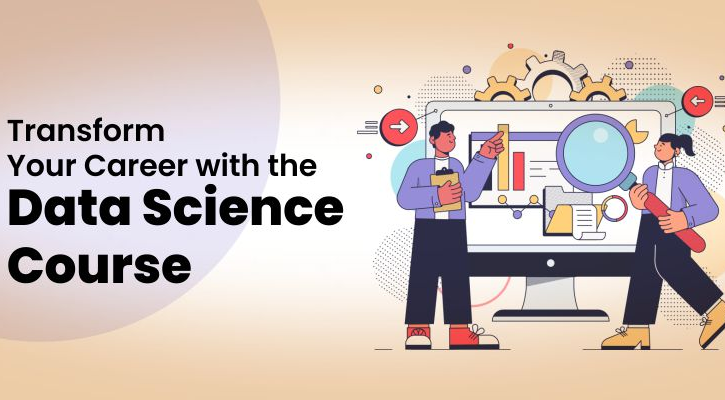In the rapidly evolving landscape of technology, one field stands out for its unprecedented impact on industries across the globe – Data Science. As businesses increasingly recognize the power of data-driven decision-making, the demand for skilled professionals in this domain is soaring. If you’re looking to take your career to new heights and play a pivotal role in shaping the future, a Data Science course, coupled with a sought-after Data Scientist Certification, could be the game-changer you’ve been seeking.
Also Read: Unlocking the Power of Conversational AI-Human Hybrid Chatbots
Why Data Science?
High Demand: Unlocking the Power of Data
Organizational Dependency on Data:
Organizations have transitioned from merely collecting data to actively leveraging it for strategic decision-making. The advent of big data and advanced analytics has heightened the importance of professionals who can interpret and derive meaningful insights from these vast datasets.
Insights for Competitive Edge:
The ability to extract actionable insights from data has become a key differentiator in the business world. Data scientists play a pivotal role in helping organizations gain a competitive edge by uncovering patterns, trends, and opportunities hidden within the data.
Career Opportunities:
The surge in demand for data scientists is evident across various industries, from tech and finance to healthcare and retail. This demand is creating abundant career opportunities for individuals with expertise in Data Science, making it a sought-after and lucrative career path.
Versatility: Bridging Disciplines for Impactful Solutions
Multidisciplinary Nature:
Data Science is not confined to a single domain; rather, it is a fusion of statistics, programming, and domain-specific knowledge. This multidisciplinary nature empowers data scientists to apply their skills across a wide spectrum of industries.
Industry Application:
Professionals in Data Science contribute to diverse sectors such as healthcare, finance, e-commerce, manufacturing, and more. Their expertise is applicable in solving industry-specific challenges, making them valuable assets in any business context.
Problem-Solving Across Domains:
The ability to understand and adapt to different domains is a hallmark of a skilled data scientist. Whether analyzing medical data for healthcare improvements or optimizing financial strategies, the versatility of data scientists makes them indispensable problem solvers.
Innovation: Driving Strategic Growth
Advanced Technologies:
Data scientists are at the forefront of leveraging advanced technologies such as machine learning and artificial intelligence. These technologies enable them to not only analyze historical data but also predict future trends and outcomes, fostering a culture of innovation.
Strategic Decision-Making:
The insights derived from data science play a crucial role in shaping strategic decisions within organizations. Whether it’s identifying market trends, optimizing operations, or enhancing customer experiences, data-driven decision-making is integral to strategic growth.
Continuous Evolution:
The dynamic nature of the field ensures that data scientists are constantly exploring new methodologies and tools to stay ahead of the curve. This commitment to continuous learning and adaptation fosters an environment of ongoing innovation.
Why Enroll in a Data Science Course?
1. Comprehensive Curriculum: A well-structured Data Science course covers a broad spectrum of topics, including statistical analysis, machine learning, data visualization, and more. This ensures you acquire a holistic skill set that aligns with industry demands.
2. Hands-On Experience: Theoretical knowledge alone isn’t enough. Quality Data Science courses incorporate hands-on projects, providing real-world experience. This practical exposure is crucial for mastering the tools and techniques used in the field.
3. Expert Guidance: Learn from seasoned professionals who bring industry insights and practical knowledge to the classroom. Their guidance can significantly accelerate your learning and help you navigate the challenges of the field.
Projects That Make a Difference
During a Data Science course, you’ll have the opportunity to work on impactful projects that bridge the gap between theory and application. For instance:
1. Predictive Analytics: Develop models that forecast future trends, enabling businesses to make proactive decisions. Tools such as Python and TensorFlow are often used to implement predictive analytics projects.
2. Sentiment Analysis: Dive into the realm of Natural Language Processing (NLP) to analyze and understand sentiments expressed in textual data. Tools like NLTK and sci-kit-learn are commonly employed for sentiment analysis projects.
Skills You’ll Gain
1. Technical Skills:
a. Programming:
Proficiency in programming languages like Python and R is fundamental for data manipulation, analysis, and model development. These languages are widely used in the data science community for their versatility and extensive libraries.
b. Data Manipulation and Analysis:
Tools like Pandas and NumPy are essential for data manipulation and analysis. Data scientists use these libraries to clean, transform, and analyze large datasets efficiently.
c. Machine Learning:
Understanding and applying machine learning algorithms is a cornerstone of data science. Tools like Scikit-Learn for classical machine learning and TensorFlow for deep learning are crucial for model development.
d. Data Visualization:
Communicating data insights effectively requires visualization. Matplotlib and Seaborn are tools that help create clear and insightful visual representations of data.
e. Database Management:
Proficiency in Structured Query Language (SQL) is crucial for working with databases. Data scientists use SQL to retrieve, update, and manipulate data stored in databases.
f. Big Data Technologies:
Handling large-scale datasets often requires knowledge of big data technologies like Hadoop and Spark. These tools enable efficient processing of massive amounts of data.
2. Soft Skills:
a. Critical Thinking:
Data scientists need to approach problems with a critical mindset, defining and formulating them in a way that data can be effectively leveraged to find solutions.
b. Problem-Solving:
The ability to develop algorithms and models to solve complex problems is a key skill. Data scientists need to devise innovative solutions to address unique challenges.
c. Effective Communication:
Translating complex data insights into a compelling narrative is essential. Effective communication allows data scientists to convey their findings to stakeholders in a way that informs decision-making.
d. Collaboration:
The ability to work collaboratively ensures the integration of data science insights into broader business strategies.
e. Continuous Learning:
The field of data science evolves rapidly. Being adaptable and open to continuous learning ensures that data scientists stay updated with the latest tools, techniques, and methodologies.
The Road Ahead
Embarking on a Data Science course is not just about acquiring a new skill; it’s about future-proofing your career. Whether you’re a recent graduate or a seasoned professional looking to pivot, the transformative impact of data science on industries ensures a wealth of opportunities.
Also Read: What 5 Advertising Trends Are Changing The Way We Promote?
In conclusion, a Data Science Course is your gateway to a career that not only offers job security and competitive salaries but also allows you to be at the forefront of technological innovation. So, if you’re ready to transform your career and become a driving force in the data-driven future, it’s time to enroll in a Data Science course. Your journey to mastering this dynamic field starts now.







